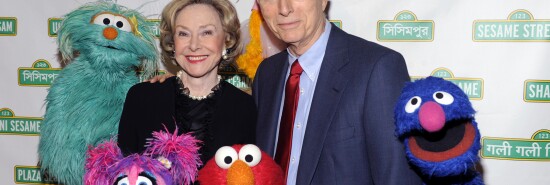
Lloyd Morrisett, 1929-2023
Daniel Ross Goodman
There are generations of children for whom our first memories are a composite of Mom and Dad, Bert and Ernie, Grandma and Grandpa, and Big Bird and Oscar the Grouch. To the many for whom Sesame Street was as much a fabric of our infancies as were highchairs and strollers, last week’s death of Lloyd Morrisett, one of the two founders of the children’s television production company that gave birth to one of the most widely watched and longest-running shows in television history, hits close to home.
Lloyd Morrisett was born in Oklahoma City in 1929, moving around with his family from Oklahoma to New York to New Jersey and then to Los Angeles, where his father got a job as a professor at UCLA in 1941. Morrisett grew up believing that he wanted to become a professor as well, and the early stages of his career proved that he would have been a very stable and successful scholar if he had continued along that path. After earning a B.A. from Oberlin College in 1951 and his Ph.D. in experimental psychology from Yale in 1956, Morrisett got a job at one of the most reputable colleges in the country — UC Berkeley — only to leave the job a few years later, finding it less satisfying than he expected. Morrisett took a job with the Social Science Research Council in New York, where he collaborated on various projects with the philanthropic wing of the Carnegie Corporation.
During his years in the council, Morrisett’s academic interests began to shift from experimental to cognitive psychology to, consequentially, developmental (i.e., childhood) psychology. Through working with the Carnegie Corp. on its educational philanthropic programs, Morrisett became aware of the challenges that children who were growing up in disadvantaged households were facing in receiving beneficial early educations. He didn’t hit on a possible solution until he noticed one morning that his 3-year-old daughter, who had been left in front of the television for some time, was singing TV jingle after TV jingle. The songs had managed to sink into her head so thoroughly that she was able to recite them almost word for word. Morrisett realized that TV was no mere diverting novelty; it could be a tool to transform the nature of early childhood education. As Morrisett told television reporter Michael Davis, “It is not too far a stretch to say that Sarah’s mastery of jingles led to a central hypothesis of the great experiment we know as Sesame Street: If television could successfully teach the words and music of advertisements, couldn’t it teach children more substantive material by co-opting the very elements that made the ads so effective?”
Morrisett proceeded to team up with the television writer and producer Joan Ganz Cooney to found the Children’s Television Workshop, with the goal of creating a children’s educational program that would be able to provide some of the elements of an early childhood education to underprivileged children through broadcast television. Morrisett secured the all-important funding for the program, from groups such as the Ford Foundation and the U.S. Commissioner of Education, while Cooney secured the commitment of a puppeteer named Jim Henson, the creator of the Muppets. After every part they needed for the show fell into place, the Children’s Television Workshop broadcast the first episode of Sesame Street on PBS in 1969. And it has never been off the air since (although its recent move to HBO Max does appear to vitiate some of Morrisett’s original intentions for an early educational show that would be as widely accessible as possible).
Sesame Street introduced many to the love of learning and to music, to humor and comedy, to playfulness and whimsy, and to the sense that the world can be a place of wonder and discovery rather than fear and trembling. (Though I must admit that as a child, for some reason, I was absolutely terrified by Guy Smiley.) For all this and more, we owe a debt of gratitude to Lloyd Morrisett, one of the lesser-celebrated but more important figures in the history of American education, entertainment, and developmental psychology.
Daniel Ross Goodman is a Washington Examiner contributing writer and the author of Somewhere Over the Rainbow: Wonder and Religion in American Cinema and the novel A Single Life.
